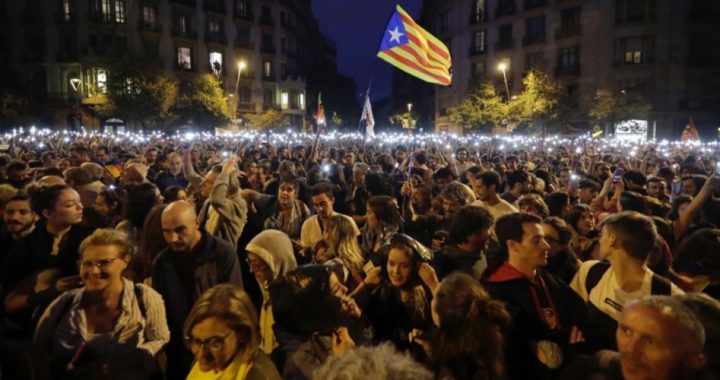
Podcast: Play in new window | Download ()
Subscribe: Android | RSS | More
“Any people anywhere, being inclined and having the power, have the right to rise up and shake off the existing government, and form a new one that suits them better. This is a most valuable, a most sacred right — a right which, we hope and believe, is to liberate the world. Nor is this right confined to cases in which the whole people of an existing government may choose to exercise it. Any portion of such people that can may revolutionize, and make their own of so much of the territory as they inhabit. More than this, a majority of any portion of such people may revolutionize, putting down a minority, intermingled with, or near about them, who may oppose their movement. Such minority was precisely the case of the Tories of our own Revolution.”
— Representative Abraham Lincoln, January 12, 1848
Protests continue in Catalonia over whether that historically autonomous region must submit to Spanish rule.
Leaders of the Catalan secession movement are calling on the government of Spain to sit down and discuss the increasing violence in Barcelona, where protests have continued for nearly a week.
As reported by Yahoo News:
Overnight Friday, radical separatists had hurled rocks and fireworks at police who responded with tear gas and rubber bullets.
Regional interior minister Miquel Buch, who backs the movement for independence, urged protestors to be peaceful on Saturday.
Regional president Quim Torra meanwhile said in a speech: “We exhort the head of the government to fix today a day and hour to sit with us for unconditional talks.”
In the early 18th Century, Spanish, and French aristocracy entered into several agreements that resulted in the end of Catalonian autonomy, autonomy that had existed for nearly 1,000 years by that time.
The treaties saw Catalonian language and government replaced by the Spanish language and more direct rule by the king of Spain.
In 2010, Spain’s Constitutional Court ruled that, whereas there was a claim that Catalonia was its own nation, today that word was only historical and cultural, without any legal significance.
That decision didn’t sit well with independence-minded Catalonians.
Torra’s demand for “unconditional talks” was met by Madrid with disregard.
We are “always been open to dialogue in the framework of respect for the law,” the Spanish government responded to Torra’s request.
The government’s statement went on to call on Torra to condemn the violence in Barcelona, which, Madrid reports, “he has not done so far.”
Official reports claim that nearly 500 people have been treated for injuries during the nearly week-long protests over the legal locus of power.
And it is the locus of power that is a political question that will persist, so long as one people insists on ruling over those who do not want to be ruled over by the other, more numerous, group.
Supposing the majority of a population wants to withdraw from the larger society to which they have been bound politically. What becomes of the minority of that people who wish to remain a part of the greater government?
In such a case, there are at least two possible answers to that important inquiry.
First, assuming that an independent Catalonia would be a socialist state (one observer described the goal of secessionists in Catalonia to be “the creation of a larger welfare state”), the would-be citizens of the country of Catalonia who didn’t wish to be robbed of resources in the name of social justice could emigrate to Spain — or France or some other nation with something closer to their own conception of a good government.
Next, there is the paradoxical fact that the perceived problems of secession are solved by more secession. As Ryan McMaken explains, “a larger number of states is preferable to a smaller number. A larger number of small states provides more practical choices to taxpayers and citizens in choosing a place to live under a government that more closely match their personal values.”
In other words, that government functions best that is closer to the ideal perceived by the people who live in that society.
There is the irrefutable fact that any segment of a population who finds that their values and governmental goals are not being pursued in their present country — who are forced to remain under that nation’s regime — are hostages. As humans, it is our inherited right to create governments, create confederacies, create coalitions, and it is our right to abrogate those things as well.
These are truths that, as Americans, we hold to be self-evident. Spain? Maybe not so much.
Therein, though, in the right of self-determination, lies the solution to the question of Catalonia and to calming the crisis that has her people stuck between Spain and sovereignty.
Pro-independence protest in Catalonia, Oct. 20, 2019: AP Images



